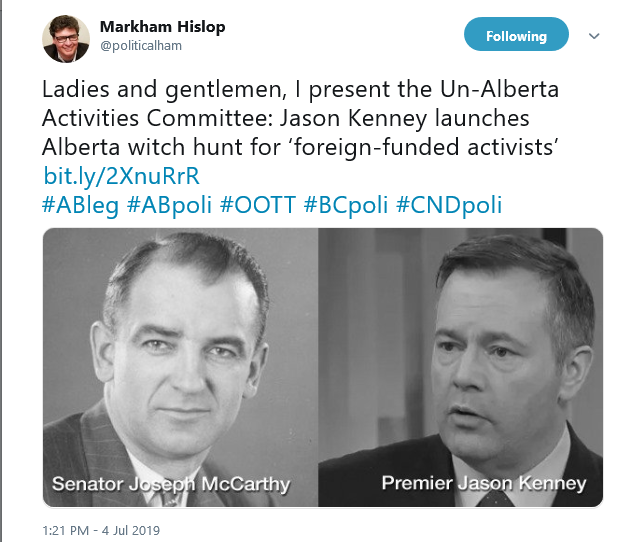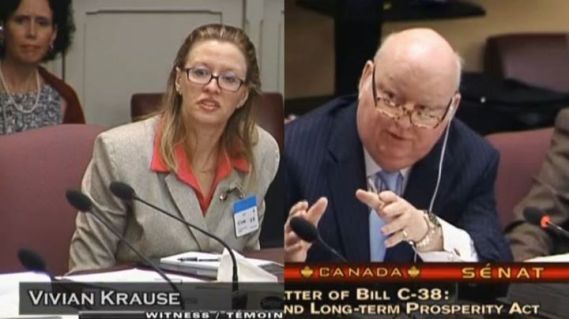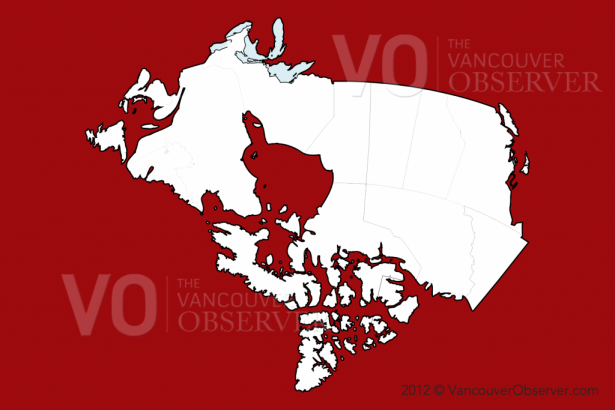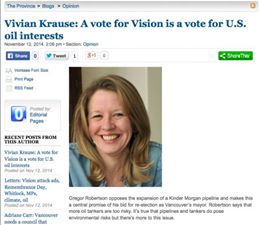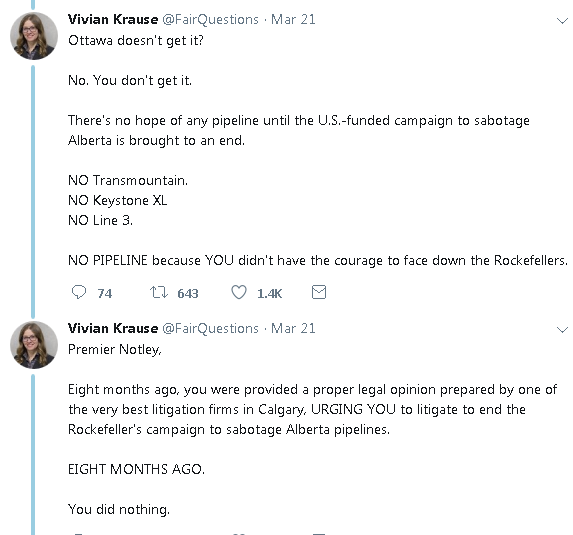The Koch Brothers and the Tar-Sands
Big Lies and Ecocide in Canada
As we know, big lies can run free across borders with few people joining the dots. For example, no media has been reporting that China’s growing dispute with Canada is based on Canada’s enforcement of the Trump administration’s unilateral embargo against Iran. This is what politicians called ‘the rule of law’. In fact, it is assisting the US takedown of China’s superior IT competition – Huawei – for not obeying the illegal US embargo.
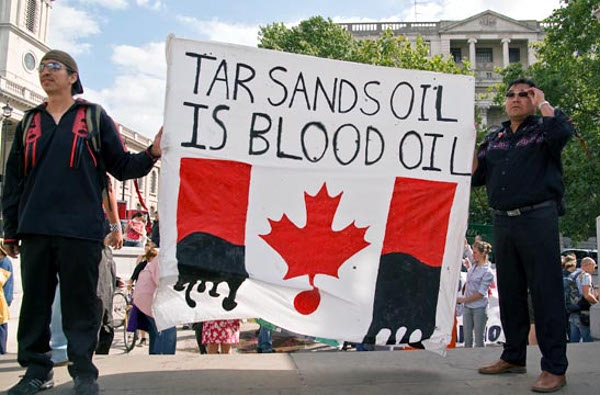 One lie builds on another. Repetition institutionalizes it. Then that becomes the truth that sells. As explained long ago by Edward Bernayes, the founder of public relations, democracy is “the manufacture of consent.” What he did not say is that only system-supporting lies may be on offer.
One lie builds on another. Repetition institutionalizes it. Then that becomes the truth that sells. As explained long ago by Edward Bernayes, the founder of public relations, democracy is “the manufacture of consent.” What he did not say is that only system-supporting lies may be on offer.
So, the imprisonment of Huawei’s vice-chairwoman and CFO Meng Wanzhou, continues as justified by ‘the rule of law’ and China is at fault for not recognizing it. Official Canada again reverts to type. It attacks the designated US Enemy, in junior partnership with its global corporate command.
Yet this time there is a new twist. Canada is attacking itself on all levels without knowing it. China has imprisoned two Canadian citizens and blocked long-standing major agriculture imports to our increasing public humiliation. The US, the actual cause of the problem, has done nothing to resolve it, and all the while, a deeper self-destruction of Canada unfolds to serve US Big-Oil demands.
The usual leaders of Canada’s branch-plant culture in politics, media news and ‘expert’ commentary just continue their barking.
Great Canada
A US Big-Oil backed juggernaut of Conservative provincial governments and the federal Opposition have been advancing for months in a campaign to reverse longstanding parliamentary decisions, environmental laws, climate action initiatives, Supreme Court directions, and First-Nations negotiations, with the goal of bringing down the current government of Canada. Yet no-one in public or media circles has joined the dots.
Canada’s vast tar-sands deposits are world famous as surpassing Saudi Arabia oil-field capacities in total barrels of potential yield. Great Canada! Yet few notice that over two-thirds of the entire tar-sands operations are owned by foreign entities sending their profits out of Canada, and that almost all its raw product is controlled for US refining and sale from which Canada is cut out.
What is particularly kept out of the daily news is the incendiary fact that the infamous, election-interfering and oft-EPA-convicted Koch brothers – who are behind Trump’s destruction of the US Environmental Protection Agency – have a dominant stake in the Alberta tar-sands as well as the massive BC-pipeline with its toxic sludge heading to tidewater while new colossal tankers plough through and pollute the BC coast.
Koch-owned industries have already extracted countless billions of their now $100-billion fortune from the Alberta tar-sands and have deployed their well-known voter-manipulations to change the balance of power in Canada as they have done in the US.
The objective is the same in both cases – ever more tax-free, publicly subsidized and state-enforced control by US Big Oil of Alberta’s massive oil resources with no public or government regulations or interferences in the way. This is called the ‘free market’.
A Short History of the Background Facts
Prior to the wide-mouth pipelines of toxic Alberta crude planned to go through BC mountains, lands and waters to dominant US processors and profits, oil has to be extracted from the vast tar-sands first. This demands a continuous gargantuan depleting and polluting of the great Athabaska Lake, River and watershed in order to steam-boil the tar out of the vast open-pit mines. These immense open-pit mines are not formed or pumped out of desert as in the Middle East. They are torn in state-size chunks out of the earth’s mantle by monstrous wrecking machines ripping out the boreal forest lands by the roots, destroying the carbon sinks and water-hold stabilization they provide in the Northern region as well as pumping out ever more climate-changing gases.
To boil the tar out of the endless open-pit mines already demands the equivalent of twice the amount of water the entire City of Calgary uses and recycles in a year. But water consumed by the tar-sand boiling is permanently polluted and wasted, and its fresh-water take from the great Athabaska watershed will only increase as the tar-sands ‘development’ is maximized, accessible oil fields are exhausted and prices rise as the still multiplying oil-waste system destroys all of its supporting natural evolution over tens of millions of years. So too, the boreal forests acting as a sink for carbon and holding the watershed together will be permanently lost. None of this costs the Kochs a penny; in fact, all of it continues to multiply their billions to even more billions.
Yet this is only the beginning of what ends up being the largest single point-source of carbon pollution and climate destabilization in the world. It pollutes produces 2.5 times more carbon gases than natural oil. Extraction mechanisms cost almost eight times more for fossil fuels than natural oil, and use overall almost as much energy as is produced!
The Long Game Depends on Ignorance of It
For many years now, completely unknown by the public, the Kochs have made most of their vast fortune from looting Canada’s tar-sands and processing billions of barrels of its toxic crude in the US. At the same time, the Kochs have led the huge financing operation behind climate-change denial of the known science that tells us that tar-sand extractions and burning produce far more toxic carbon gases than regular oil.
Most of all, the Kochs have acted out of sight with their Alberta fronts and partners to ensure control over elected governments that might regulate or interfere with their above-the-law rampage across the continent. The Kochs spent more than the Republican Party itself on the 2012 US elections. They invented and funded the Congress-upending Tea-Party, and they finance endless attack ads against all resisters to their domination of the US Congress and Senate (and covertly, the Trump Oval Office).
The Kochs are, in short, cartoonish Big Oil robber barons leading the meltdown of the planet, with Canada as their primary looting basin. Also never said in the news media, the Kochs are behind the destabilization of Venezuela ever since its elected President Hugo Chavez refused to sell Venezuela tar-sand crude at the old cheap rates. The Venezuelan tar-sand bitumen was processed in Koch owned monolithically polluting Flint refineries in Corpus Christi, Texas. This spewing giant multi-smokestack operation lies on the growing dead-zone in the Gulf of Mexico, and is yet another destination for future leviathan tankers out of BC to be filled with Koch-owned Alberta tar-sand crude to replace the huge supply lost from Venezuela.
Their long “cash cow” – in their accountants’ words – is their Pine Bend refinery in Minnesota, which has been processing tens of thousands of barrels of raw Alberta tar-sand crude as their ace-in-the-hole from the beginning.
In fact, the deadly Koch drive wheel of Canada’s politics has flown under the radar in Canada all along. Since being promoted to the senior position in place of Stephen Dionne, Canada Foreign Affairs Minister Chrystia Freeland has more recently jumped onto the Koch-agenda bandwagon with both feet. She fits well with the Koch-led tyranny over governments that might try to resist, regulate or tax their free-booting plunder and poisoning of the Earth. Freeland’s Foreign Affairs has connected the US fight against Putin to open up Ukraine’s (and eventually Russia’s) vast resources to the war against Bolivar-socialist Venezuela for Koch control of its vast tar-sands again. The de facto goal is to gain total transnational corporate rights to loot and pollute all lands they can connect – now sixty countries in all – on ever larger scales of pillaging that overrides all sovereign control, ownership or direction.
Canada is in the Koch’s cross-hairs too if it stands up to them. But Freeland is like a glove to the Koch-led agenda. After being a cheerleader for the US-led coup in Ukraine in 2014 and then promoted to Foreign Minister, she has war-drummed against Russia, with the facts of conflict repressed in the mass media and official culture. This is why it is never reported that the majority Russian-speaking citizens of Eastern Ukraine rebelled in 2014 against the mass-murderous, Nazi-led coup d’etat that overthrew the elected president. Freeland herself has a background in the conflict – the maternal grand-daughter of the known Ukrainian-born, lead Nazi-media propagandist, Michael Chomiak (a brief scandal around her was quickly resolved by anti-communist justification). The dominant image now is of Russia as a Putin-led bully over Ukraine and its people, all the better to get the vast oil and other natural resources of both through their ‘liberation’. In fact, Kiev itself is the ancient original founding capital of the Rus people; Crimea has been Russian territory since Catherine the Great prevailed against the Ottoman Empire there; and it was the Ukrainian Communist Party Chairman Khrushchev who separated Ukraine from Russia.
More useful to the Kochs, who are immediately seeking re-control of vast Venezuela tar-sands which, in fact, weakens Canada’s own position, Freeland has formed the ‘Lima group’ of new right-wing regimes in Latin America to overthrow Venezuela’s elected Bolivarian socialist government and its public control of the oil resources. Here, every move of illegal interference is big-lied as being based in “legitimate democracy” and “the Constitution of Venezuela.” Thrown into the mix has been Canadian Global Affairs operatives like Ambassador Allan Culham, who as Canada’s Ambassador has been active in all the Latin American coups overthrowing social-democratic governments in recent years, and is now a private contractor for Global Affairs Canada enlisted to disseminate these big lies throughout Venezuelan civil society.
Few know any of this, and no-one follows the dots back to the Kochs. Canada’s tar-sands have replaced the lost Venezuela tar-sands until both can flood the world with multiplied carbon profits for the brothers. They now play with a politically loaded deck, including the support by Global Affairs Canada by CIA-style operations in at least Latin America.
The BC pipeline to tidewater further increases the extent of the Kochs’ control of raw Alberta crude and will multiply oil tanker traffic. The pipeline’s construction is now imperative for their multi-billion investments in the tar-sands. They cannot continue to be ‘developed’ big-time without such market outlets. There are now as many Koch tar-sand licenses for extraction and refineries as can be stripped, fresh-water boiled and wide-mouth piped out for them. In fact, Alberta premiers and the provincial and national media continue to push for ever more crude-to-market deliveries in order to ensure “Alberta jobs,” “foreign investors” and the “unity of Canada.”
Aftermath of the June 18 Go-Ahead of the BC Pipeline
At the official federal approval of the trans-mountain BC pipeline to tidewater on June 18, Finance Minister Morneau affirmed the pipeline by saying it ‘gives us an advantage in price by not depending on the US market’. In truth, once the toxic tar-sands crude crosses the Rocky Mountains to the inland multiplying tankers waiting on the Orca-habitat coasts to transport it, it goes wherever it is most profitable for its mainly US-controllers to ship it. Yet the Finance Minister waves a Canada market and hints at a shadowy non-US destination of China. Well, “our” toxic tar-sand tanker loads are not Canada’s to begin with. Only the shoddy pipeline bought for the mainly US owners is temporarily Canadian at five billion dollars of taxpayer costs, and it transports the toxic product to open sea-lanes for more Koch-led Big Oil trafficking and carbon pollutions.
As for a China destination for Canada toxic crude, China has been made an adversary, and is now blocking even import of Canada’s agricultural products. It is understandably enraged that Canada has imprisoned her leading corporate citizen and CEO of Huawei, the emergent global internet champion over the US with its stunning global market success in IT technology and sales. In supreme hypocrisy, the Canada claim of ‘obeying the rule of law’ in imprisoning the Huawei CEO blames China for not respecting the international norms and law that Canada is itself violating on the demand of the US for her extradition as a tactic in its trade war with China as well as on the basis of an illegal embargo against Iran.
In fact, this is ultimately a political imprisonment demanded by the US that Canada has delivered with no foundation in the normal extradition requirement – a crime or offence that is unlawful in Canada as well as the US. Canada’s Ambassador to China John McCallum long ago pointed this out in legally circumspect and diplomatic language. Yet the subterranean US-cum-CIA-news-service control of ideological reflexes across Canada’s official culture became immediately clear, but with no-one noticing. The political and mass-media roof – including CBC – fell on McCallum for doing the right thing.
More deeply in matters of uncontrolled carbon pollution destroying life and life-support capacities on Earth, the Liberal government’s justification of the massive BC pipeline-to-ocean of toxic Alberta tar-sand crude is revealing. The naming of a non-US market for this Alberta crude as a ‘price advantage’ implies that the government plans to enforce the pipeline in order to transport endless toxic tanker tar-sand crude across BC and the Channel Islands for over 9000 more kilometers of more carbon effluents across the Pacific Ocean to China or East Asia. The future implications of the policy here is so carbon-irresponsible and opposed to government commitments the mind boggles. But ocean transports, like air transports, have been kept out of the Paris Agreement led by the UA and Canada for just such reasons.
No matter which way things go, it seems, the big lies only grow bigger as the tar-sand ecocide extends its reach. There seems no end to the black hole and the mendacious cover stories. But one very Alberta attempts over months to turn the Senate into an extra-Parliamentary force of Big-Oil bullying to stop it, Bill C-48, the Oil Tanker Moratorium Act, just received Royal Assent on June 21, 2019. It bans heavy-tanker traffic on the iconic Northern BC coast up to Alaska. It is closed for now.
‘Alberta Jobs’ and ‘National Unity’
In Canada, the governing parties and the corporate media have had such a media-transmitted love-in with Big Oil that even Alberta’s NDP Premier Rachel Notley militantly demanded for years – as a moral obligation to Alberta as well as to all of Canada – that the US-dominated tar-sands mega project receive ever more rights and public subsidies to run its crude over neighboring BC mountains and the inland whale-inhabited ocean channels.
The spell of ‘national unity’ to sell Alberta’s US-controlled oil sands is not broken even as the forest fires and floods in BC, Alberta and Ontario rage beyond all records from the carbon-destabilized climate. Six new pro-developer premiers of Canada and the leader of the federal opposition have been shouting that delays to the Big-Oil pipelines are “breaking up the country.”
US Big Oil, led by the Kochs’ political war chest and already covertly dominating the US Senate and Presidency, has long gotten its way by such polarizing propaganda. Yet in Canada the line of division is portrayed by the national media as the “unity crisis” facing the country. Fortifying the big lies in think-tank gown is the Fraser Institute, forever cited by the media and bullying public policy formation in the guise of an independent professional source of economic knowledge and information. None points out that according to Canada’s tax records the Fraser Institute has received over $750,000 from just one of the Koch foundations.
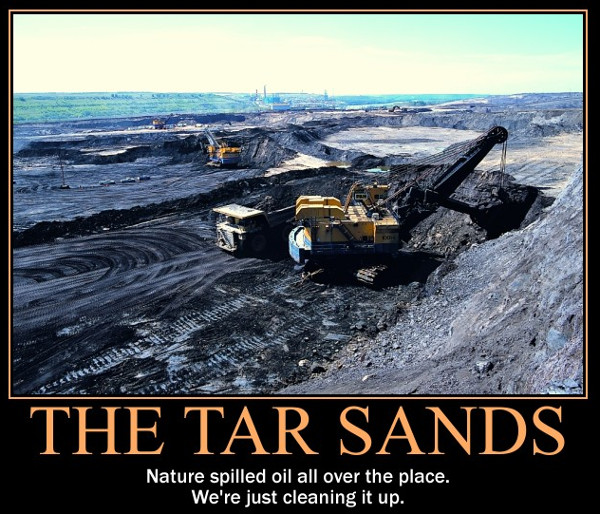 Big Oil’s crucial step in putting the tar-sands into the driver’s seat of Canadian politics has gone beneath the radar. First of all, it assumes a premise which no-one questions that all the toxic raw product must be piped unprocessed through Canada to foreign refineries, and that Canada must duly enforce this off-shore refinement “as a national priority.” Once this false premise is established as a given, it follows that the Alberta crude must be piped raw and irreversibly toxic across the BC mountain forests and aquifers, and then into its paradisal inland ocean channels for oil-tanker transport – now demanding a rarely mentioned seven-times more oil-tanker traffic carrying a toxic product that cannot be cleaned up.
Big Oil’s crucial step in putting the tar-sands into the driver’s seat of Canadian politics has gone beneath the radar. First of all, it assumes a premise which no-one questions that all the toxic raw product must be piped unprocessed through Canada to foreign refineries, and that Canada must duly enforce this off-shore refinement “as a national priority.” Once this false premise is established as a given, it follows that the Alberta crude must be piped raw and irreversibly toxic across the BC mountain forests and aquifers, and then into its paradisal inland ocean channels for oil-tanker transport – now demanding a rarely mentioned seven-times more oil-tanker traffic carrying a toxic product that cannot be cleaned up.
Any ‘delays’ to the US-Big-Oil agenda (which has the support of more ‘junior’ Canadian oil companies, are then attacked as against ‘national unity’. They are called ‘illogical’ and ‘punishing Alberta’ – even when the time is legally required for amending legislation that has been ordered by the Supreme Court of Canada as well as for negotiating with the First Nations whose lands and waters will be overrun by the dirty-oil project in the midst of a supposed period of ‘national reconciliation’.
In fact, the governing premises here are lawless and driven by what the Kochs specialize in – a fanatic anti-government agenda claiming to be for tax-payers and citizens. The rule of law is implicitly dismissed. Carbon pricing legislated by elected governments – which sane oil corporations now accept as economically required – is ferociously attacked.
Even Parliament’s long-passed Bill C-48 protecting the Northern BC Coast from heavy oil-tanker traffic (tankers carrying over 10,500 metric tons of tar-sand crude) – a bill supported and voted for by over two-thirds of MP’s – has been so militantly attacked in the Senate of Canada that even when it finally passed on June 21, there were howls of outrage led by Conservatives and big-oil fan Jason Kenney to reverse it.
Thus, the single most important legal protection of Canada’s greatest environmental treasure, one that has been the negotiated decision of Parliament and a condition for the oil-pipe through BC, has been marked for elimination even after full parliamentary reviews of both Houses, royal consent and publication. The federal Conservative Party goes along, and even its ever-smiling leader Andrew Scheer has promised if elected in the approaching federal election to abolish Bill C-48. The Koch-fronted Fraser Institute agrees.
The worst part of the whole multiplying Big-Oil tar-sands mega-project may be the mammoth toxin-filled tankers ploughing through and despoiling the world’s most awe-inspiring green inland coasts in BC. These coasts are an ecological paradise comprising a world of whales, eagles, biodiverse life and breathtaking music of nature with thriving indigenous peoples protecting the environment since ancient times.
That the current Big Oil forces, Alberta Conservatives, the federal Conservative Party, many in the Senate of Canada, and various corporate media and fronts are still all seeking to reverse the already-legislated Bill C-48 protection of even the Northern BC coasts from this grossest abuse demonstrates how cancerous the Big Oil tar-sands mega-project has become.
Yet in the unseen, historic shell-game going on behind the scenes, there is a convenient perpetual side-show of attacks on PM Trudeau, whose unforgivable sin is not to push the oil-pipes and tankers through BC fast enough.
Led by Jason Kenney as Premier and the so-far invisible Koch brothers, the Conservative Party across provinces and federally is engaging in an implicit war against any public control over or regulation of Big Oil. Any legal impediment to the massively toxic extraction and export through Canada’s most pristine natural environments to US control, the refineries and the far more profitable foreign market is reverse portrayed as an attack on Alberta and a strike at Canada’s unity as a country.
The assumed absolute necessity of this pipeline and tanker extension of the multiplying tar-sands project is, in fact, the demand of US-led Big Oil to loot and pollute Canada’s natural resources for value added in the US (including oil sales back to Canada at multiplied prices). Yet every politician is supine before the transnational Big Oil powers involved. Even Liberal leader Stephan Dionne who won the Liberal leadership in 2006 on an environmental platform dared not question the Koch-led tar-sands mega-project. “There is too much money in it,” he responded to environmentalist concerns.
With all these unseen premises against Canada’s common life interests now cast as inalterable necessity, the trap is well set. With the federal election slated to occur before October 21, all the wheels are being oiled for a Conservative toppling of the Liberal government and an override of any resistance to the biggest force-play of US-led Big Oil in Canada’s history.
The Unspeakable Contradiction
No-one yet recognizes that the Koch-led US Big Oil plan will actually result in the loss of all the Alberta ‘jobs’, ‘investment’, ‘tax revenues’ and ‘prosperity’ that it promises to deliver. In fact, all of these economic benefits would actually materialize and multiply many times if the tar-sands were processed and refined for Canadian, US and global sale inside Alberta.
Most ironic of all, the most serious immediate danger of Alberta tar-sand crude is its irreversibly toxicity because it is not processed before it is transported. This is what the BC resistance on the ground is most motivated by – the irreversibly disastrous consequences when this unprocessed toxic crude spills anywhere along the way. The spills are an historically demonstrated certitude, but like climate destabilization itself, are denied by the Big-Oil beneficiaries of future tens of billions in private profit.
As always in the ruling narrative, there is ‘no alternative’. ‘It must be done now to create jobs and get product to market’. Astonishingly, no-one in government or the mass media observes the fact that many more well-paying permanent jobs, far more oil revenues, and infinitely more safety from tar-oil spills and dirty-oil carbon effluents are assured by processing the raw bitumen in Alberta itself.
What has not been recognized is that the political stampede for the trans-mountain pipeline is based on a very big lie. If Alberta and Canada’s government, globally competitive Canada oil firms and working people really want to ‘create jobs’, ‘get product to market’, ‘achieve environmental security’, ‘provide needed investment and revenues for the Canadian people’, and ‘reduce climate-destabilizing gases’ the option is economically self-evident.
Process the tar-sand product in Canada and Alberta where the uncleanable toxins can be stripped out by rigorous regulation and safely precautions before they are flooded through huge breakable pipes across a 5000-year-old ecological wonder, larger and more unspoiled than any in the world.
However, just as climate science does not matter to rogue Big Oil, so too is the option of prevention erased from discussion. No mainstream party or mass media voice even mentions the environmental risks of pipelining the toxic crude through the mountains and coasts of BC when it could be cleaned up in Alberta first (although the Greens have done so, to the shock of some environmentalists). None yet flags all the lost Canadian fortune and economic development going down the drain by handing over control to the Big-Oil multi-billionaires like the Koch brothers. As for the foreign interference in Canada’s elections manipulating every step, none reports this either.
And all this for what? The driver is not ‘jobs and prosperity’, ‘creating and sharing wealth’, and ‘making the indigenous people independent’ (what a Canada Senator incredibly just wrote to me). The truth is the opposite on every count. Tens of thousands of high-paying jobs, escalated tax revenues, immense new domestic profits and investment opportunities are now all wasted for Canada by letting four times more of the value-added go South to US Big Oil.
The ultimate consequence here is the dispossession of Canada’s workers, First Peoples, taxpayers and the common wealth by ever more multi-billion private profits extracted from its public lands at the lowest oil-royalties in the world to further enrich the already obscenely rich who are mostly not tax payers and are, in effect, lead destroyers of the life support capacities of the planet. •
SEE https://plawiuk.blogspot.com/2019/07/jason-kenney-launches-alberta-witch.html






 B.C. researcher argues anti-Alberta oil campaigns about protecting U.S. interests, not environment
B.C. researcher argues anti-Alberta oil campaigns about protecting U.S. interests, not environment Alberta to offload crude by rail contracts, raises oil quotas for August
Alberta to offload crude by rail contracts, raises oil quotas for August Higher oil prices, more tax income: Alberta ends 2018-19 with smaller deficit
Higher oil prices, more tax income: Alberta ends 2018-19 with smaller deficit
/https://www.thestar.com/content/dam/thestar/uploads/2019/07/03/cpt504548325-0.jpg)

